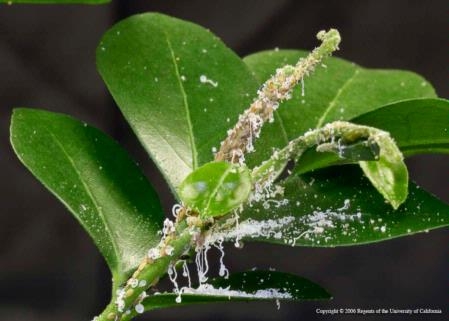Natural enemy of Asian citrus psyllid coming soon to SoCal
At a Nov. 16 research symposium in Oxnard, hosted by the University of California Cooperative Extension and Hansen Agricultural Center, UC Riverside entomologist Mark Hoddle said that he had completed the testing required to secure federal approval for release of a tiny wasp that preys on ACP, reported John Krist in the Ventura County Star.
The federal government has promised to expedite approval, the article said. Some of the natural enemies - collected in the Punjab, Pakistan - could be carrying the fight against ACP into Los Angeles yards by the end of the year.
Hoddle also said a citrus variety he observed being grown in the Punjab appears able to survive and produce fruit despite the presence of ACP and HLB.
Drought and rising temperatures will challenge California's farmers, experts say
By Suzanne Bohan, Contra Costa Times
In the past century, the state's winter lows have warmed by 2 degrees Fahrenheit, "a significant increase," Dan Sumner, director of the Agricultural Issues Center, told a forum last week. Although that warming trend hasn't yet disrupted crops, it is accelerating, he said. "There's potential for complete crop failure, especially cherries, apricots and other stone fruit," said Louise Jackson, a UC Davis researcher. As an example, Sumner said that as winters heat up, peach growers in the warmer southern San Joaquin Valley may have to move northward, where it's cooler. With California's diversity of crops and different microclimates, the agricultural system has a natural resiliency, although Sumner said now is the time to begin researching ways to best cope with anticipated changes. "I think the risk is we don't take it seriously enough," Sumner said. "The lesson here is you have to have enough research and development to adapt and be flexible. And I don't think we're doing enough."
Health hazards similar in San Joaquin, Coachella valleys
Marcel Honoré, The Desert Sun
A new study on the the environmental health risks across Central California describes conditions strikingly similar to those confronting many eastern Coachella Valley residents. More than 1 million people living in the sprawling San Joaquin Valley face serious health risks from toxic air, polluted water and other environmental factors, according to a University of California, Davis, report published earlier this month.
Food chain holds promise
Doug Ford, The (Vacaville) Reporter
The Solano and Yolo County Joint Economic Summit on agriculture, held at the University of California, Davis, Alumni Center, noted that the area boasts some of the best land and water resources in the world and is ideally located between the populous San Francisco Bay Area and the state capital, with an excellent transportation infrastructure connecting us with world markets. The local "food chain industry," the article said, contributes about 10 percent of the gross domestic product of the area, and its products added up to about $2.5 billion in 2009.
Bravo Lake garden keeps local youths out of trouble
David Castellon, Visalia Times-Delta
Manuel Jimenez and his wife, Olga, spent Black Friday at the Bravo Lake Botanical Garden — the 13-acre public garden and walking trail they helped create about eight years ago — along with a group of teenage boys who volunteered to help.
“The garden is not our goal,” said Jimenez, 61, a University of California Cooperative Extension farm advisor. “Our goal is to grow kids. Our goal is to make something of them.”

